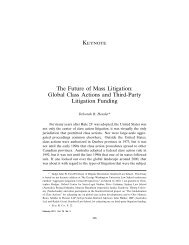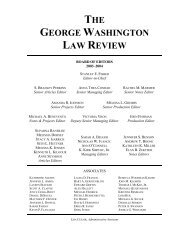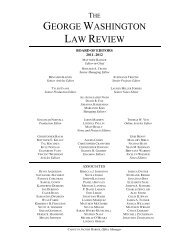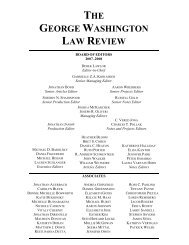View PDF - The George Washington Law Review
View PDF - The George Washington Law Review
View PDF - The George Washington Law Review
You also want an ePaper? Increase the reach of your titles
YUMPU automatically turns print PDFs into web optimized ePapers that Google loves.
852 <strong>The</strong> <strong>George</strong> <strong>Washington</strong> <strong>Law</strong> <strong>Review</strong> [Vol. 78:846<br />
gree out of the methodology’s perceived inefficiencies. As practiced<br />
in recent decades, the taking and preservation of oral histories involved<br />
a great deal of audio (and sometimes video) tape, which is a<br />
somewhat expensive and cumbersome medium. 29 Those concerns<br />
have abated somewhat, as digital technology and the Internet have<br />
reduced concerns about both storage and accessibility. 30 A related<br />
concern is that the methodology is too inclusive in the sense that the<br />
taking of an oral history almost inevitably entails the gathering of<br />
more trivial than significant information. 31<br />
Even when performed properly, oral history has its limitations.<br />
When used as a means of inquiry into some general phenomenon (i.e.,<br />
consideration of some general topic such as “what was law school like<br />
in the 1950s?”), the methodology runs the risk of generating only anecdote.<br />
32 <strong>The</strong> problem of generating anecdotes is less acute when the<br />
inquiry concerns a specific historical episode in which the subject of<br />
the oral history was a key player. But in both cases oral history is<br />
evidence delivered from a vantage point that is susceptible to<br />
problems of memory, bias, and other symptoms of subjectivity. 33 Unsurprisingly,<br />
witnesses may simply fail to remember the specifics of<br />
the events they are asked to recall, may remember them in ways that<br />
are self-serving, or may succumb to the temptation to recount events<br />
in a way that casts themselves in a favorable light. 34 To counter this,<br />
interviewers must be well prepared, such that they are able to ask<br />
questions and follow up in a way that prompts recall and forestalls<br />
efforts to omit details or otherwise distort the past. 35 Efforts to avoid<br />
one risk, however, may create another. Oral history is unique in that<br />
the historian is involved in the creation of a portion of the historical<br />
record. 36 Letters, memos, diaries, and the like are subject to question<br />
arising out of the author’s self-interest. But none of the flaws possible<br />
in such sources can be prompted by the historian in the way that is<br />
possible where the historian is the one asking the questions. 37 <strong>The</strong><br />
29 See id. at 30–31.<br />
30 See id. at 37.<br />
31 See id. at 30.<br />
32 Ronald J. Grele, Oral History as Evidence, in HANDBOOK OF ORAL HISTORY, supra<br />
note 26, at 43, 45.<br />
33 See Anna Green, Oral History and History, in REMEMBERING: WRITING ORAL HISTORY<br />
1, 2 (Anna Green & Megan Hutching eds., 2004) (noting the objection that oral history relies too<br />
heavily on memories, which are “both unreliable and subjective, and frequently unverifiable”).<br />
34 See RITCHIE, supra note 25, at 117–18.<br />
35 See id. at 98–100, 105.<br />
36 See Grele, supra note 32, at 49.<br />
37 At least not in any direct sense. No doubt many such authors view themselves as writ-









